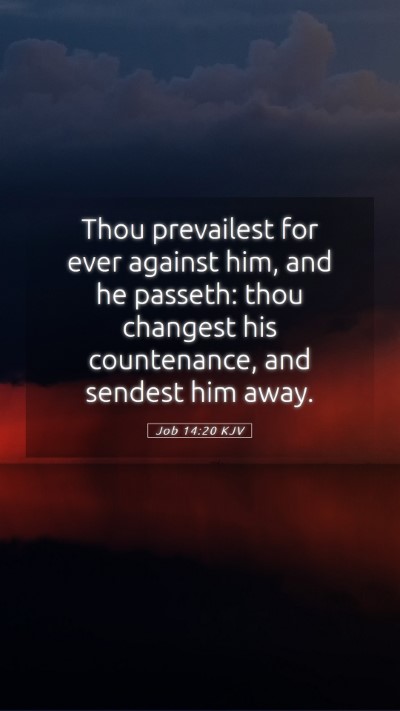Old Testament
Genesis Exodus Leviticus Numbers Deuteronomy Joshua Judges Ruth 1 Samuel 2 Samuel 1 Kings 2 Kings 1 Chronicles 2 Chronicles Ezra Nehemiah Esther Job Psalms Proverbs Ecclesiastes Song of Solomon Isaiah Jeremiah Lamentations Ezekiel Daniel Hosea Joel Amos Obadiah Jonah Micah Nahum Habakkuk Zephaniah Haggai Zechariah MalachiJob 14:20 Meaning
What is the meaning of Job 14:20?
Thou prevailest for ever against him, and he passeth: thou changest his countenance, and sendest him away.
Job 14:20 Bible Verse Meaning
Understanding Job 14:20
Job 14:20 states:
"Thou prevailest forever against him, and he passeth: thou changest his countenance, and sendest him away."
Bible Verse Meanings
This verse reflects Job's deep understanding of the human condition and the relationship between man and God. It signifies the inevitability of death and the transient nature of life, emphasizing that while God has dominion over life and death, humans face the reality of their mortality.
Bible Verse Interpretations
Various commentaries provide unique insights into this verse:
-
Matthew Henry:
Henry describes this verse as a reflection on the futility of human existence in front of divine power. It portrays a sense of defeat that Job feels, understanding that God's will prevails over all human efforts and struggles.
-
Albert Barnes:
Barnes emphasizes that Job recognizes the transitory nature of life and how God has control over every aspect of it. This commentary points out the inevitability of death as a divine ordinance that no human can resist or evade.
-
Adam Clarke:
Clarke provides a theological perspective, stressing that God’s sovereignty not only brings about physical death but also impacts the spirit. He elaborates on how Job's acknowledgment of God's eternal control over life and death reflects his wrestling with faith amidst suffering.
Biblical Exegesis
In this verse, Job expresses the sensation of being at the mercy of God's ultimate authority. The idea of "changing his countenance" symbolizes God’s power to affect human fate and dispel the hope of enduring life as we know it.
Bible Study Insights
When studying this verse, it is important to consider:
- The historical context of Job's suffering and the dialogues between him and his friends.
- The nature of divine sovereignty, particularly in how it relates to human suffering.
- The universal themes of mortality, despair, and hope that permeate the Book of Job.
Application of Bible Verses to Daily Life
Job 14:20 can be applied in various contexts of our lives:
- Understanding the transient nature of our earthly existence fosters humility.
- Acknowledging God's sovereignty can provide comfort amidst life's tribulations.
- Reflecting on this verse encourages individuals in Bible study groups to confront hard truths with faith.
Related Bible Cross References
This verse can be related to the following scripture passages:
- Psalm 39:4-5 - Contemplating the brevity of life.
- Ecclesiastes 3:1-2 - The seasons of life and time for every purpose.
- 2 Corinthians 5:1 - The assurance of eternal life beyond physical death.


